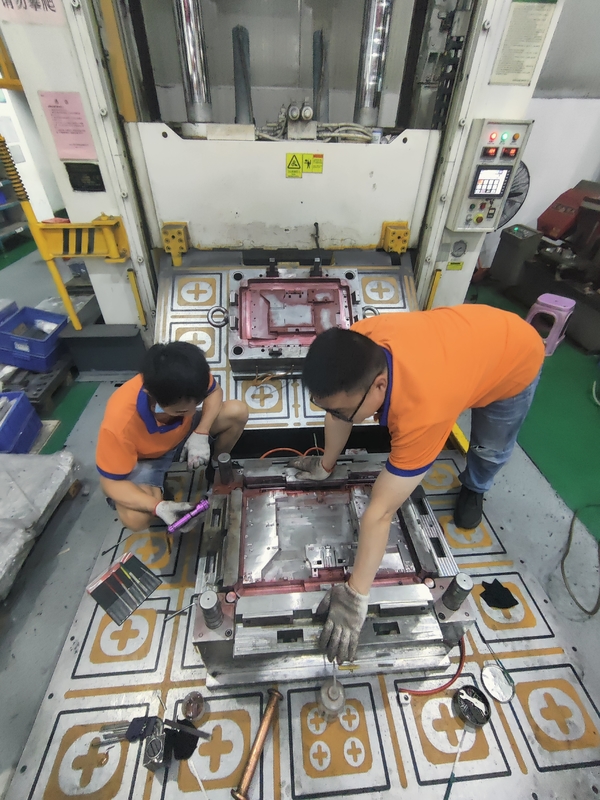Plastic Injetion Molding
Plastic injection molding utilizes the high-pressure injection of melted plastics or resins into custom-designed molds to produce
solid plastic parts and components. This highly versatile method is used for the production of a variety of products made from
a broad selection of plastic materials compounds.
Compared to other plastic manufacturing processes, plastic injection molding offers several advantages, including higher precision
parts and the facilitation of more cost-effective high-volume runs.
| Type of Thermoplastic Material |
Unique Features |
Common Applications |
| ABS |
durable, lightweight |
electronics, keyboards, phone hardware, LEGO bricks, drainpipe systems, kitchen appliances
|
| polyethylene |
flexible, impact-resistant, leech resistant, moisture resistant, recyclable |
food packaging, milk jugs, toys |
| polypropylene |
leech resistant, flexible |
Tupperware, kiddie pools, toys, utensils, car batteries
|
| polystyrene |
warp, shrink and impact resistant |
compact disc cases, packaging applications, household appliances
|
| nylon / (POM) |
heat-resistant, durable |
high-ware parts, quick-release buckles, gears, hand cranks
|
| polycarbonate |
impact resistant, optical clarity, vulnerable to chemicals |
automobile headlights, bulletproof glass, eyeglasses, greenhouses, DVDs, mobile phones
|
Advantages of ABS Injection Molding
The advantages of the ABS injection molding process include impressive dimensional stability and stability under load, its ability
to be alloyed by other polymers, recyclability, and its aesthetic properties.
Good dimensional stability
ABS plastics are dimensional stable at ambient temperatures up to their highest operating temperature. This advantage makes ABS
a cost-effective material for applications where other plastics bend or warp under similar conditions, such as accessories, vacuum system components or housings.
High load stability
ABS plastic will maintain its stability and rigidity under load until its thermal deformation temperature, making it suitable for load-bearing applications such as brackets, fasteners, clamps and other load-bearing applications.
Easily alloyed with other polymers
ABS plastics are easily combined with other polymers to form alloys, where the rigidity, scratch resistance and dimensional stability of ABS combined with the properties of another polymer make the material superior to its sum. This ability made possible the formulation of another
very popular polymer mixture, PC-ABS, which retains the strength of ABS but is also more heat and impact resistant. This makes ABS an attractive option for polymer manufacturers when manufacturing application-specific plastic grades.
Pleasing to the eye
ABS plastics can achieve a variety of colors and high gloss with the use of steam or other finishing processes. ABS plastics are
therefore ideal for toys, models and other applications where appearance is crucial.
The cost of producing the mold can be reduced by applying the following design guidelines:
|
Evaluate the CAD model to determine its feasibility before undertaking an injection molding project. Eliminate potential bottlenecks such as steep angles, undercuts, and other complex geometries.
|
|
Evaluate the model’s design to eliminate unnecessary features. This reduces the mold’s size and the material used to develop the model.
|
|
Apply a core cavity approach that simplifies the design of Side B of a mold. The core cavity approach involves sinking the wall cavities into the mold base, thereby reducing the need to mold steep draft angles while improving surface finish.
|
|
Embrace the use of self-mating parts to reduce the need to create multiple molds when one universal mold can be used to achieve similar results.
|
- High Impact Resistance: ABS exhibits exceptional durability, making it ideal for products requiring toughness.
- ABC plastic properyies: Can be easily modified to enhance characteristics like UV resistance or flame retardancy.
- ABS plastic balances strength and rigidity and is suitable for various applications.
- Good Dimensional Stability: Maintains shape and form even under stress, ensuring product consistency.
- Ease of Processing: Can be molded into complex shapes and sizes, allowing for design flexibility in manufacturing.
- Cost-Effectiveness: Low material cost and efficient production make it a budget-friendly option.
- Recyclability and Environmental Sustainability: ABS can be recycled, reducing waste and promoting eco-friendly manufacturing practices.
Physical Properties of ABS Plastic
The physical properties of ABS plastic refer to the attributes that are observable or measurable without changing the material’s identity.
These include properties like density, melting point, and thermal conductivity.
Mechanical Properties of ABS Plastic
The mechanical properties of ABS plastic refer to how the material responds to applied forces. These include properties such as tensile strength, impact strength, and hardness.

QC checking before ship the product:

Payment term:

Shipping way:

After service:


 Your message must be between 20-3,000 characters!
Your message must be between 20-3,000 characters! Please check your E-mail!
Please check your E-mail!  Your message must be between 20-3,000 characters!
Your message must be between 20-3,000 characters! Please check your E-mail!
Please check your E-mail! 
